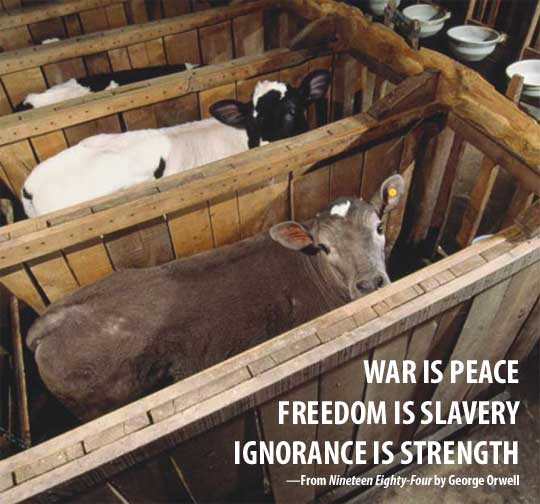The first viewing of Earthlings left me relatively skeptical. Although the documentary certainly succeeded in evoking emotion, it left me feeling empty-handed. The narrator observes, “ordinary human beings (not a few exceptionally cruel or heartless humans, but the overwhelming majority of people), take an active part in, acquiesce in, and allow their taxes to pay for practices that require the sacrifice of the most important interests of members of other species, in order to promote the most trivial interests of our own species.” The moral claim made by the documentary is very clear: everyone is complicit in this suffering. Even citizens who unknowingly fund this treatment of animals through their taxes are partially responsible for these problems. I couldn’t help but recall a passage from Pascal Bruckner’s book The Tears of the White Man, in which he describes the methods used by “the prophets of guilty conscience” to “con¬front us via the media with all the suffering of the human race, in the face of which the slightest gesture of generosity is an in¬adequate act of charity” (Bruckner 63). This has the potential to be life-negating, if one reaches the conclusion that “our very existence is an insult to the human race. We have only one duty—to wipe ourselves off the face of the earth.51 The future of the West is self-destruction” (Bruckner 66). Considering individual citizens have no control over how their taxes are distributed, much of the suffering seems to function solely to create feelings of guilt for the viewer. I’m not entirely convinced that being confronted with this suffering is necessarily useful when one has no avenues to alleviate the pain.
 |
| am i to blame for the status quo? |
Recognizing one’s complicity in a system of hierarchies is not inherently life-negating, however. Lecturer in Politics at Goldsmiths College Saul Newman argues that it is only “by acknowledging that we come from the same world as power, not from a 'natural' world removed from it, and that we can never be entirely free from relations of power, that one can engage in politically-relevant strategies of resistance against power” (Newman 30). I feel like Newman’s analysis holds true to the subject of animal suffering and Earthlings. By making me feel complicit in the suffering of animals, Earthlings was not necessarily crossing any lines. However, I do not think that the documentary achieved a useful purpose by situating my complicity in aspects of power relations that I have no control over. Instead, by providing many specific political alternatives to the problems that they are criticizing, Earthlings had the opportunity to open up avenues of resistance. However, without a documentary that leaves room for resistance to the awful treatment of animals, it seems that a change in social consciousness will never achieve material change.
 |
| we must search for new political alternatives |
Pascal Bruckner. The Tears of the White Man: Compassion As Contempt. 1986. pp. 63-66.
Saul Newman. “Anarchism and the Politics of Ressentiment”. Theory & Event 4:3. http://muse.jhu.edu/journals/theory_and_event/v004/4.3newman.html. Accessed: 17 November 2010.


No comments:
Post a Comment